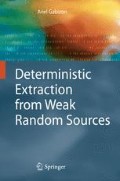Summary
An \((n,k)\)-affine source over a finite field \({\mathbb F}\) is a random variable \(X=(X_1,...,X_n) \in {\mathbb F}^n\), which is uniformly distributed over an (unknown) k-dimensional affine subspace of \({\mathbb F}^n\). We show how to (deterministically) extract practically all the randomness from affine sources, for any field of size larger than \(n^c\) (where c is a large enough constant). This chapter is based on [25].
Access this chapter
Tax calculation will be finalised at checkout
Purchases are for personal use only
Notes
- 1.
A line is a 1-dimensional affine subspace of \({\mathbb F}^n\).
- 2.
Our extractors will sometimes output bits and sometimes output field elements. Therefore, the definition here uses a general output domain.
- 3.
Actually, we can construct a \({deterministic\, (k,\epsilon)-affine\,source\,extractor}\) that outputs \(k-1\) random elements in \({\mathbb F_q}\) and \(\lfloor(1-\delta) \cdot \log q\rfloor\) random bits for any constant \(0<\delta<1\).
- 4.
See Lemma 3.10 for an exact formulation of such an instantiation.
- 5.
- 6.
We use a slightly different expression than the one given here to ensure that f will not be of a certain restricted form on which Weil’s theorems don’t apply.
- 7.
The Reed-Solomon encoding of \(x=(x_1,\ldots,x_n) \in {\mathbb F_q}^n\) at location \(u\in {\mathbb F_q}\) is defined as \(\sum_{i=1}^n x_i\cdot u^i\).
- 8.
A character χ of \({\mathbb F_q}^{*}\) is extended to 0 by \(\chi(0)=0\).
- 9.
It is known that \(Tr(a)\in\mathbb F_2\) for every \(a\in {\mathbb F_q}\).
- 10.
We interpret the field elements 0 and 1 as the corresponding integers.
- 11.
Characters of higher order are also extractors, but with larger error.
- 12.
In [26] the authors assume all distributions are over binary strings, but it is easy to see that the proof follows in the case stated here.
Bibliography
N. Alon. Tools from higher algebra. In R. L. Graham & M. Grotschel & L. Lovasz (eds.), Handbook of Combinatorics, Elsevier and The MIT Press, volume 2. 1995.
N. Alon, O. Goldreich, J. Håstad, and R. Peralta. Simple constructions of almost k-wise independent random variables. In Proceedings of the 31st Annual IEEE Symposium on Foundations of Computer Science, volume II, pages 544–553, 1990.
B. Barak, G. Kindler, R. Shaltiel, B. Sudakov, and A. Wigderson. Simulating independence: New constructions of condensers, Ramsay graphs, dispersers, and extractors. In Proceedings of the 37th Annual ACM Symposium on Theory of Computing, pages 1–10, 2005.
J. Bourgain. On the construction of affine extractors.Geometric And Functional Analysis, 17(1):33–57, 2007.
A. Elbaz. Improved constructions for extracting quasi-random bits from sources of weak randomness.M.Sc. Thesis, Weizmann Institute, 2003.
A. Gabizon and R. Raz. Deterministic extractors for affine sources over large fields. In Proceedings of the 46th Annual IEEE Symposium on Foundations of Computer Science, pages 407–418, 2005.
A.Gabizon, R. Raz, and R. Shaltiel. Deterministic extractors for bit-fixing sources by obtaining an independent seed.SICOMP: SIAM Journal on Computing, 36(4):1072–1094, 2006.
R. L. Graham and J. H. Spencer. A constructive solution to a tournament problem.Canad. Math. Bull., 14:45–48, 1971.
A. Hales and R. Jewett. Regularity and positional games.Trans. Amer. Math. Soc., 106:222–229, 1963.
M. Naor, A. Nussboim, and E. Tromer. Efficiently constructible huge graphs that preserve first order properties of random graphs. In TCC, pages 66–85, 2005.
R. Raz, O. Reingold, and S. Vadhan. Extracting all the randomness and reducing the error in Trevisan’s extractors. In Proceedings of the 31st Annual ACM Symposium on Theory of Computing, pages 149–158, 1999.
W. M. Schmidt. Equations over Finite Fields: An Elementary Approach, volume 536. Springer-Verlag, Lecture Notes in Mathematics, 1976.
R. Shaltiel and C. Umans. Simple extractors for all min-entropies and a new pseudo-random generator. In Proceedings of the 42nd Annual IEEE Symposium on Foundations of Computer Science, 2001.
A. Ta-Shma, D. Zuckerman, and S. Safra. Extractors from Reed-Muller codes. In IEEE, editor, Proceedings of the 42nd Annual IEEE Symposium on Foundations of Computer Science, pages 638–647, 2001. IEEE Computer Society Press.
L. Trevisan. Construction of extractors using pseudorandom generators. In Proceedings of the 31st ACM Symposium on Theory of Computing, 1999.
A. Weil. On some exponential sums. In Proc. Nat. Acad. Sci. USA, volume 34, pages 204–207, 1948.
Author information
Authors and Affiliations
Corresponding author
Rights and permissions
Copyright information
© 2011 Springer-Verlag Berlin Heidelberg
About this chapter
Cite this chapter
Gabizon, A. (2011). Deterministic Extractors for Affine Sources over Large Fields. In: Deterministic Extraction from Weak Random Sources. Monographs in Theoretical Computer Science. An EATCS Series. Springer, Berlin, Heidelberg. https://doi.org/10.1007/978-3-642-14903-0_3
Download citation
DOI: https://doi.org/10.1007/978-3-642-14903-0_3
Published:
Publisher Name: Springer, Berlin, Heidelberg
Print ISBN: 978-3-642-14902-3
Online ISBN: 978-3-642-14903-0
eBook Packages: Computer ScienceComputer Science (R0)

